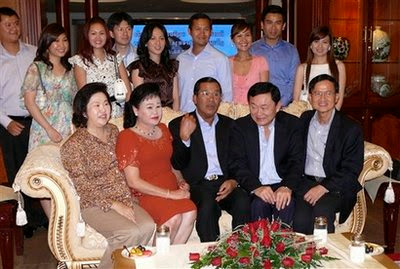Target price of 1,000 riels per kWh still too high, opposition says

Photo by: TRACEY SHELTON
A worker helps add a new electricity line in Phnom Penh. Cambodia’s high electricity prices remain a major barrier to economic development, analysts say.
OVERNMENT officials say they hope development of the hydroelectric power industry in Cambodia will enable them to provide energy to provincial and rural areas for less than 1,000 riels (US$0.24) per kilowatt-hour (kWh) by 2011, still high by regional standards but far less than the current cost in some parts of the Kingdom.
Energy Minister Suy Sem said he expected four dams to be in operation by 2011 as well as a coal-fired power plant in Sihanoukville and anticipated that several other dams would come online the same year, and in 2012, to reduce Cambodia’s reliance on imported oil for electricity.
“We will be able to supply electricity to local consumers at less than 1,000 riels per kilowatt-hour, when we can produce electricity from hydroelectric dams instead of generating it by using oil,” he said.
Lower prices would give a boost to domestic producers and help attract investors, he added.
Ty Thany, director of Finance and Price Setting at the Cambodian Electricity Authority, said electricity from hydroelectric dams could be sold for between 800 and 900 riels per kilowatt-hour, compared to the 1,600 to 2,800 riels per kilowatt-hour, for electricity generated from diesel.
“However, we may not be able to sell electricity at much less than 1,000 riels per kWh to everybody throughout the country within the first few years because hydroelectricity can be generated in a few provinces only,” Ty Thany said.
Even at 800 riels per kilowatt-hour, the cost of accessing electricity will remain a major competitive disadvantage for Cambodia, according to major global organisations, including the Asian Development Bank, the International Monetary Fund and the United Nations.
The ADB said in a report in early November that electricity prices in Cambodia were the highest in the ASEAN region due to the fragmented nature of electricity grids, the small size of most power plants and the use of imported diesel for around 95 percent of electricity generation.
“This dampens the country’s attractiveness to industrial locators,” the report noted.
Last week, the IMF said the high cost of electricity, which accounts for around 15 percent of total production costs, was a key structural weakness undermining the competitiveness of Cambodia’s garment sector.
Garment exports have fallen more that 20 percent this year, but Cambodia has been hit harder than its regional competitors and loss share in the key US market.
The IMF assessment was based on an average electricity cost of $0.22 (920 riels) per kilowatt-hour, much higher than the $0.07 it costs in Vietnam, but even in Cambodia, that price is only available near centres of production.
According to a United Nations Development Programme report released earlier this year, tariffs charged by rural electricity enterprises (REE) range from $0.30 to $0.90 per kilowatt-hour.
Price target still too highSam Rainsy Party parliamentarian Son Chhay said the target price of 1,000 riels per kilowatt-hour was insufficient to make Cambodian producers competitive in comparison to neighbours Thailand, Laos and Vietnam, where electricity prices were three times lower.
“I think if the government could re-examine electricity prices and lower them to 300 riels per kWh, it would be good,” he said.
The first 10-megawatt (MW) phase of the $280 million Kamchay hydroelectric dam went live in Kampot province last week. The dam, built in three stages by Chinese state firm Sinohydro, will generate 193.2MW when it is fully operational in 2011.
Suy Sem said the 120MW Stung Atay hydroelectric dam will open in 2012, as will the 300MW Russei Chrum and 200MW Stung Tatay dams. The coal-fired plant under construction in Sihanoukville will yield 100MW of electricity and would also come into operation in 2012, he added.



